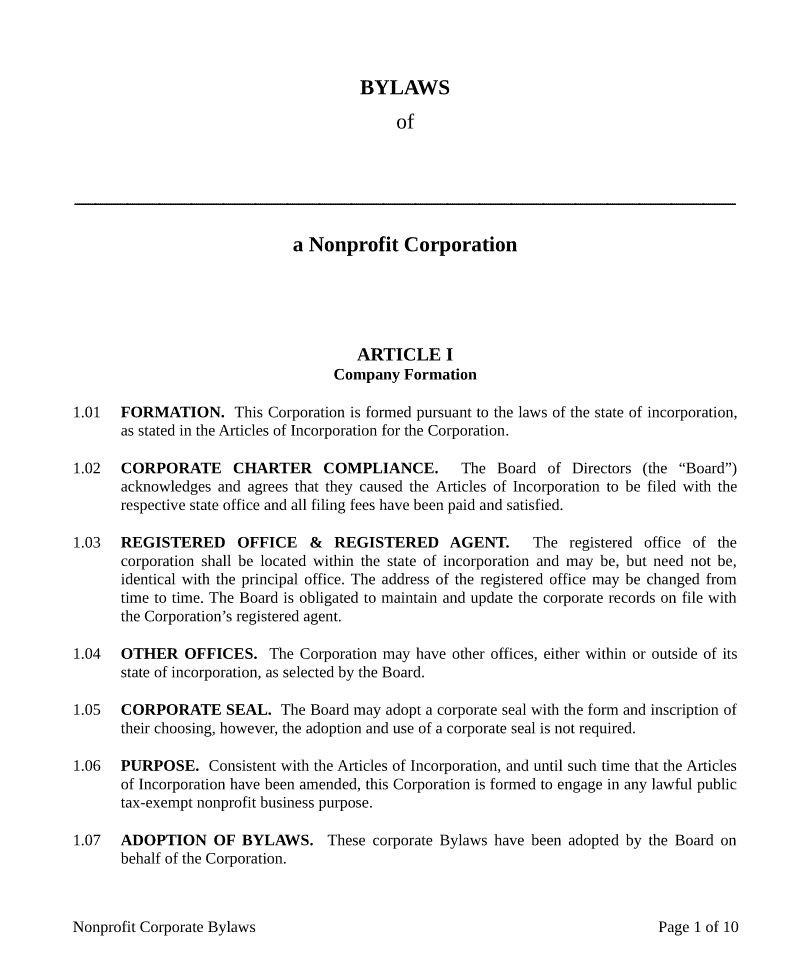Washington Nonprofit Bylaws
Washington nonprofit bylaws are a guidebook for how to manage your nonprofit. Intended for your board of directors, officers, and other employees, your bylaws list out the rules and protocols for your nonprofit to follow. Everything from compensating directors to merging your nonprofit can be covered.
Not sure how to begin? Our attorney drafted a free-to-download nonprofit bylaws template that you can use to start writing.
Why does a Washington nonprofit need bylaws?
Unlike your Washington Nonprofit Articles of Incorporation, the state of Washington does not require that you submit your nonprofit bylaws to the Secretary of State. So you might be wondering: why bother?
Even outside of compiling a list of best practices and guidelines for your nonprofit to follow, your bylaws are important for several reasons. Let’s go over the top three.
1. Nonprofit bylaws are legally required in Washington.
First and foremost, your bylaws are legally required! According to the Washington Nonprofit Corporation Act (WA Rev Code § 24.03A.125), your board of directors must adopt your bylaws. This is mandatory for all Washington nonprofits—so that’s one good reason to make sure you have nonprofit bylaws.
2. Third parties will ask to see your bylaws.
Another reason to have your bylaws ready to go is that third parties might need to see your bylaws. Your bank, for example, might require your bylaws to verify the authority of someone trying to open a bank account in your nonprofit’s name. Or, donors might request a copy of your bylaws to check out your business practices before committing to financial donations. Additionally, the IRS requires a copy of your bylaws with your 501(c)(3) tax-exempt status application.
3. Nonprofit bylaws allow you more control over your nonprofit.
Lastly, your bylaws offer your nonprofit greater control over the outcome of disputes. If your bylaws are thorough and encompass tricky situations, you can solve disputes by following your bylaws. Without bylaws, you might be taken to court to settle disputes, and the resolution will be out of your nonprofit’s hands.
Want to learn more? Check out our Guide to Nonprofits.
What do Washington Nonprofit Bylaws include?
Washington nonprofit bylaws can include anything that the board of directors choose, so long as none of the bylaws go against your Articles of Incorporation or legal statutes. Typically, this includes your general information, such as your nonprofit’s purpose, the members, and business address, along with protocols that you want the board to follow. Consider including regulations for how to:
- add new board members
- remove board members
- hold meetings and reach a quorum
- compensate directors
- keep records
- amend bylaws
- merge the nonprofit
- dissolve the nonprofit
Are nonprofit bylaws legally binding?
Yes. Your bylaws, once adopted, are legally binding. You could face legal consequences if your nonprofit, or anyone acting on its behalf, does not follow your bylaws.
Are nonprofit bylaws public record?
Not automatically. Your bylaws are an internal document for your board of directors, officers, and other employees to use. However, your bylaws will become public if you choose to apply for 501(c)(3) tax-exempt status. The IRS requires that your bylaws are attached to your tax-exemption application. The IRS makes your application, along with your bylaws, public.
FAQs
No, your bylaws are legally binding regardless of signatures. However, we do recommend that your board of directors sign. This is common practice for nonprofits, as it makes sure the whole board is on the same page from day one.
Absolutely. According to WA Rev Code § 24.03A.690, your board of directors have “the power to alter, amend or repeal the bylaws or adopt new bylaws” as they see fit, unless there are specific processes outlined in your bylaws or articles.
There’s no mandatory requirement to amend your bylaws, but you will probably want to make changes periodically. As your nonprofit grows, your bylaws will need to grow with you.
Your board of director adopts your bylaws, usually at your first organizational meeting.
